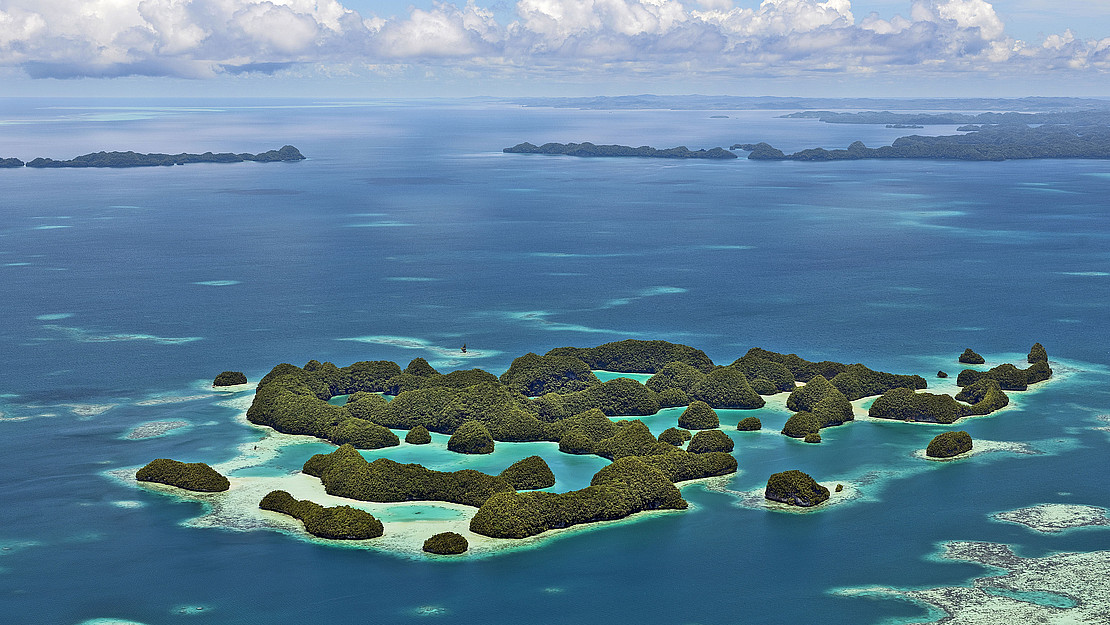This page contains automatically translated content.
Marine animal named after Kassel sociologist
 Image: Picture Alliance/Arco Images GmbH
Image: Picture Alliance/Arco Images GmbHBogusz is a professor at the Department of Sociology of Social Disparities. Her topic: inequalities between social actors. Tanja Bogusz's research is closely related to ethnology. She studies social milieus by means of field research, also called ethnography. Directly through observation on the ground. One of her projects took her to the South Seas for a marine biology expedition on the coast of Papua New Guinea. A sociologist on a biological expedition? "The natural sciences are also a social milieu," Bogusz says. "I wanted to understand their inner laws and communication structures."
To do so, she collaborated with scientists at the Muséum national d'histoire naturelle in Paris. "Natural sciences are an exciting field of research," she says. The global ecological crisis is changing them, she adds. "Climate change, overfishing, species extinction, all of these are affecting science. I wanted to explore their transformation processes." So she did, and experienced more than gray theory.
Exploring the research
Bogusz spent a lot of time with marine biologists at the Paris Museum. She researched the researchers: interviewed them, observed their work, took notes. That's how she wanted to gain knowledge about their work. But the special thing about marine biology is not found under a microscope or at a desk. "I wanted to go on a marine biology expedition and see researchers at work in the field," Bogusz says. "I'm interested in people and what they do."
In late 2012, French marine biologist Philippe Bouchet invited her on an expedition. The Fritz Thyssen Foundation covered the cost of Bogusz's ethnography. The destination: the South Seas, the coast of Papua New Guinea. A region whose name derives from German colonial history - the "Bismarck Archipelago": a collection of tropical islands between turquoise-blue Pacific waters. "We were often in the lab at first," Bogusz says. "Then it was out to the ocean. We were driven to the coast in pickup trucks. From there, we went out to sea in inflatable boats, where the researchers searched for marine animals." Bouchet's team collected and classified snails and mussels there.
"Tangible" criticism
Those who explore animals often face all-too-human problems. As with any expedition, many agreements with governments and local governments are necessary. And even then, there can be difficulties. Papua New Guinea has historically resisted many attempts at colonization and has a political system based on local self-determination by the population. "In some regions, the state has little influence," Bogusz said. "Here, the clans rule." And they can't take a joke at their
waters. "They thought we were foreign corporations endangering their fish stock and grabbing resources." That's sad everyday life in the South Sea republic, Bogusz said. As a result, expedition members were attacked and pelted with stones by coastal residents.
The scientists negotiated with clan representatives. "Here, too, I was allowed to be present," Bogusz said. With explanations of their work and skillful diplomacy, the researchers were able to move on. The expedition was successful - and not just for the biologists.
A world under a burning glass
Bogusz's research was also fruitful. "I was able to look into numerous social milieus and gain insights into how diverse social groups cooperate with each other." Scientists, local politicians, students, clans, one expedition brings many people together. "It was a world under a burning glass." She also gained knowledge about the state of marine biology. "The great biodiversity in countries like Papua New Guinea is slowly being lost," she says. "That's why locals, civil society and researchers are working under greater pressure today. They want to explore as much as possible."
But what is it like to do research? Marine biologists as research subjects? "The staff was very open and interested, explained a lot to me," Bogusz says. "My presence was appreciated." She was able to quickly answer queries about her research. "'You are my shells,' I used to tell colleagues." Especially after the expedition, Bogusz experienced the team's special appreciation. "Bouchet told me he wanted to have one of the animals he discovered named after me." Since then, the snail species Joculator Boguszae has existed. A great honor.
This article appeared in publik 1/2019 (March 20, 2019).
By David Wüstehube